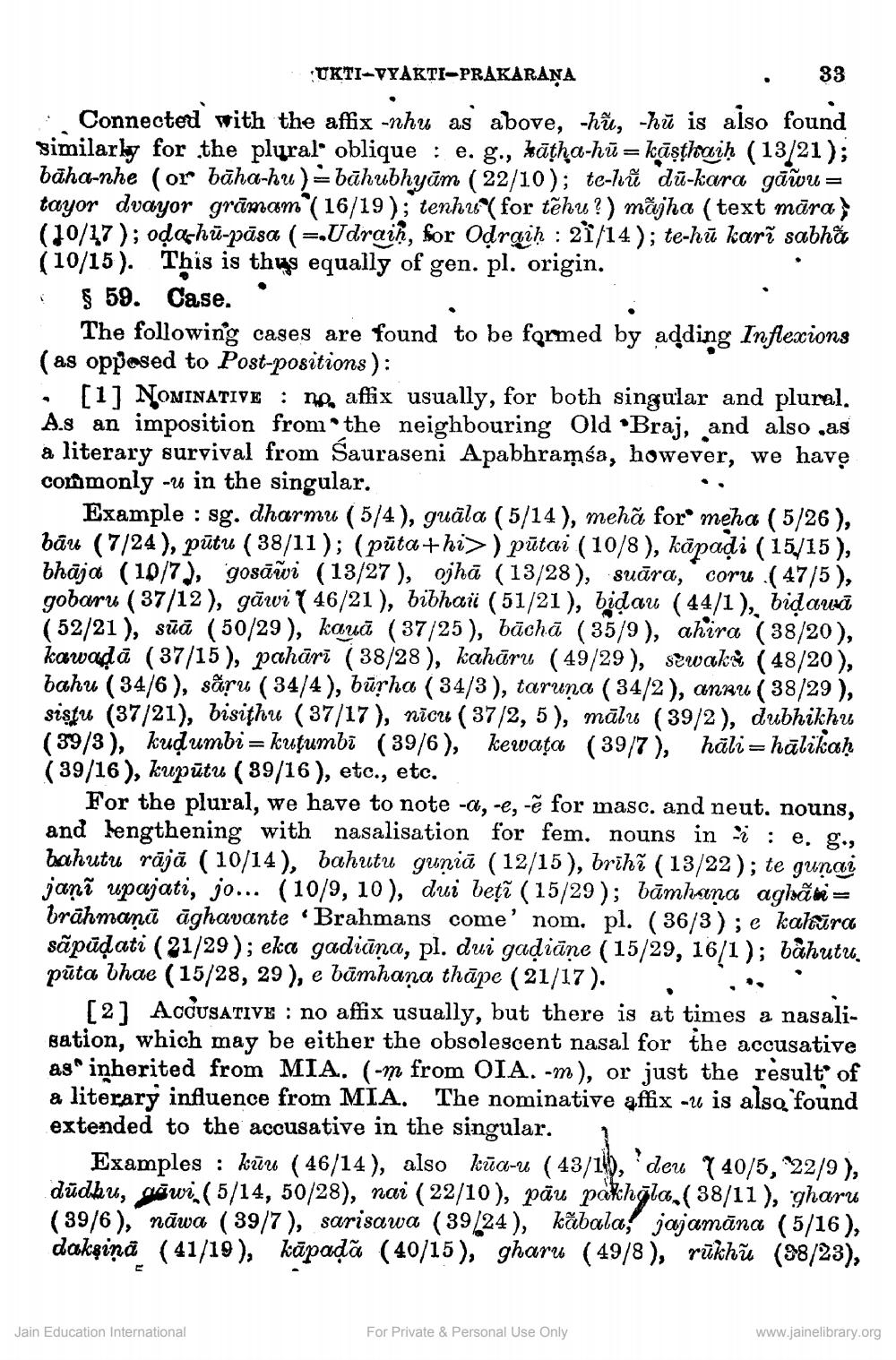________________
UKTI-VYAKTI-PRAKARANA
. 33 : Connected with the affix -nhu as above, -hí, -hū is also found similarly for the plural oblique : e. g., kātha-hū= kāşthai” (13/21); bāha-nhe (or bāha-hu ) = bāhubhyām (22/10); te-hů dū-kara gāữu = tayor dvayor grāmam (16/19); tenhus (for těhu ?) májha (text māra (10/17); odachū-pāsa ( = Udraiḥ, for Odraih : 21/14); te-hū karī sabha (10/15). This is thus equally of gen. pl. origin.
§ 59. Case..
The following cases are found to be formed by adding Inflexions (as opposed to Post-positions): · [1] NOMINATIVE : no affix usually, for both singular and plural. A.s an imposition from the neighbouring Old •Braj, and also as a literary survival from Sauraseni Apabhraņía, however, we have commonly -2 in the singular.
Example : sg. dharmu (5/4), guāla (5/14), mehă for meha (5/26 ), bâu (7/24), pūtu ( 38/11); (pūta+hi>) pūtai (10/8), kāpadi (15/15), bhāja (10/7), gosāži (13/27), ojhā (13/28), suāra, coru :( 47/5), gobaru ( 37/12), gāwi ( 46/21 ), bibhai (51/21), bidau (44/1), bidausī (52/21 ), sūā (50/29), kaud (37/25), bāchā (35/9), ahira (38/20), kawadā (37/15), pahārī (38/28 ), kahāru (49/29), szwaks ( 48/20), bahu ( 34/6), sãru ( 34/4), būrha ( 34/3), taruna ( 34/2), annu ( 38/29), siştu (37/21), bisithu ( 37/17), nīcu ( 37/2, 5), mālu (39/2), dubhikhu (39/3), kudumbi = kutumbi (39/6), kewata (39/7), hāli=hālikah ( 39/16), kupūtu ( 39/16), etc., etc.
For the plural, we have to note -a, -e, -ē for masc. and neut. nouns, and lengthening with nasalisation for fem. nouns in ė : e. g., bahutu rājā (10/14), bahutu gunia (12/15), brihã (13/22); te gunai jani upajati, jo... (10/9, 10), dui bețā (15/29); bāmhana agrãmi = brāhmaṇā āghavante "Brahmans come' nom. pl. (36/3); e kaldira sãpūļati (21/29); eka gadiāņa, pl. dui gadiāne (15/29, 16/1); bahutu. pūta bhae (15/28, 29), e bümhana thāpe (21/17). . .,
[2] ACCUSATIVE : no affix usually, but there is at times a nasalibation, which may be either the obsolescent nasal for the accusative as" inherited from MIA. (-m from OIA. -m), or just the result of a literary influence from MIA. The nominative affix -2 is also found extended to the accusative in the singular. 1
Examples : kūu ( 46/14), also kūa-u (43/14), 'deu 740/5, 22/9), dūdiku, māwi (5/14, 50/28), nai (22/10), pāu pakhğla,(38/11), gharu (39/6), nāwa (39/7), sarisawa (39/24), kābala, jajamāna (5/16), dokşină (41/19), kāpaļa (40/15), gharu (49/8), rūkhữe (98/23),
Jain Education International
For Private & Personal Use Only
www.jainelibrary.org




